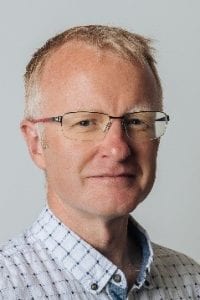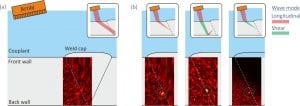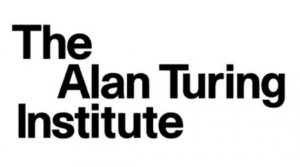As a part of our blog series ‘Introducing the University of Bristol’s Turing Fellows’, the Jean Golding Institute (JGI) have been interviewing several of the academics at the University of Bristol who have recently become Alan Turing Institute Fellows.

Check out the first blog of our series, featuring Iván Palomares Carrascosa and his work with the Decision Support and Recommender Systems Research Group (DSRS).
In our second blog of this series, the JGI spoke to Paul Wilcox, Professor of Dynamics and Control in the Faculty of Engineering and recently appointed Turing Fellow.
JGI: What are your main research interests?
My main research interests centre around ultrasound, signal processing and imaging applied to Non-Destructive Evaluation (NDE) of safety-critical components and structures.
JGI: Can you give a brief background of your experience?
I began working in NDE with a PhD on the use of guided elastic waves for testing water pipes. My specific area of expertise is quantitative assessment of an object’s properties using elastic or acoustic waves over a frequency range from kilohertz (audible) to tens of megahertz (ultrasound). I have worked on applications ranging from critical welds in nuclear power stations to testing the ripeness of avocados. I was a founder of a spin-out company (Inductosense Ltd.) with other colleagues from Bristol in 2015.
I enjoy the intellectual challenge of NDE, the interaction with a diverse range of industries and the sense of common purpose in the NDE community. The latter is especially evident in the UK Research Centre in NDE (RCNDE), of which Bristol was a founding member in 2003. Over the last decade, I have spent more and more time on signal processing and physics-based data analysis to squeeze ever more information out of individual NDE measurements. The natural next step is to start to lever data science to extract more information from multiple different NDE measurements over the lifetime of a component to allow more accurate prognosis of its current state and remaining life.
JGI: What are the big issues related to data science / data-intensive research in your area?
The NDE data for a component can come from many different measurement modalities (e.g. X-ray CT, electromagnetic eddy current measurements, ultrasonic testing, visual inspection) each probing different quantities with different resolutions and over different timescales ranging from daily to once a decade. Dealing systematically with data that is heterogeneous in time, space and modality is the first major challenge.
Furthermore, NDE is driven by the ‘edge cases’: most components do not contain dangerous defects and the purpose of NDE is to find the few that do. Proving to regulators that an NDE technique can achieve the necessary defect detection reliably is a major issue anyway, and techniques that use data science will face the same challenge.
A final point, which stems from the fact that most components do not contain dangerous defects, is that there is a shortage of ‘true-positive’ data on which to test data analysis methods. For this reason, high-fidelity simulations that accurately reproduce experimental measurements are increasingly important.
JGI: Can you tell us of one recent publication in the world of data science or data-intensive research that has interested you?
I’m still feeling my way in data science, trying to get to grips with the main schools of thought and work out which approaches are likely to be suitable for NDE. To this end, I’m starting with some popular science books on AI (e.g. The Master Algorithm by Pedro Domingos, which I am now reading for a second time).
Recent publications from the NDE field (including some from my group) showing how numerically-simulated ultrasonic data from defects can be merged with experimental data to produce vast quantities of exceptionally realistic ‘true-positive’ data will, I think, prove crucial for the field of NDE data science going forwards.

JGI: How interdisciplinary is your research?
NDE is a multi-disciplinary field that is essential across many industries. Research involves physicists, engineers of all flavours (mechanical, aerospace, civil, electronic), material scientists and mathematicians.
JGI: What’s next in your field of research?
Building the basic mathematical framework for drawing heterogenous NDE data together; understanding more about the other constraints in industry (logistic, commercial, legal, regulatory etc); working with industry to select a few exemplar demonstrator applications.
JGI: If anyone would like to get in touch to talk to you about collaborations / shared interests, how can they get in touch?
Email me at p.wilcox@bristol.ac.uk
JGI: Are there any events coming up that you would like to tell us about?
I’m in the process of putting together a kick-off workshop to bring NDE experts from academia and industry together with data scientists. It will probably be held late spring at a venue either in Bristol or at the Alan Turing Institute in London. If you are interested in contributing or attending, please get in touch.
__________________________________________________________________________________________________________________________________________________________________
More about The Turing Fellows
Thirty fellowships and twelve projects have been awarded to Bristol as part of the University partnership with the Turing. This fellowship scheme allows university academics to develop collaborations with Turing partners. The Fellowships span many fields including key Turing interests in urban analytics, defence and health.
Take a look at the Jean Golding Institute website for a full list of University of Bristol Turing Fellows.
The Alan Turing Institute
The Alan Turing Institute’s goals are to undertake world-class research in data science and artificial intelligence, apply its research to real-world problems, drive economic impact and societal good, lead the training of a new generation of scientists and shape the public conversation around data.


